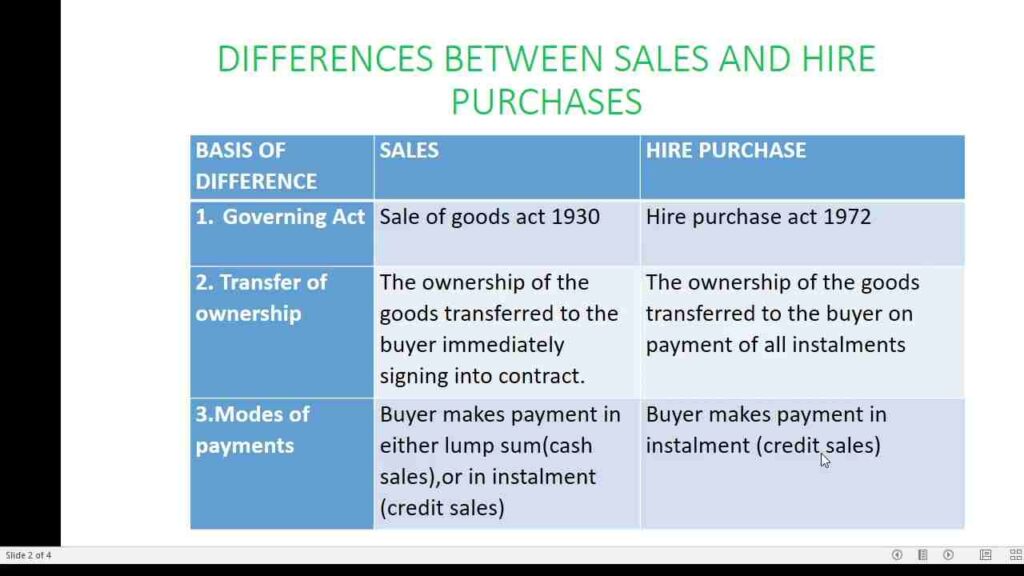
Explore Key 15 Difference between Hire Purchase and Purchase
When it comes to making significant purchases, individuals often find themselves faced with the decision between hire purchase and outright purchase. Both options offer distinct advantages and considerations. In this article, we will explore 15 key difference between hire purchase and purchase, shedding light on the unique aspects of each method.
15 Difference between Hire Purchase and Purchase
Ownership: When a product is bought outright, ownership is immediately transferred. When using a hire purchase, ownership only becomes transferable after all financial obligations have been satisfied.
Initial Cost: Hire purchase allows for cost spreading over a period of time, typically with a down payment followed by monthly installments, whereas outright purchase requires full payment up front.
Financial Flexibility: By allowing people to purchase goods without having to pay the full amount up front, hire purchase preserves financial liquidity.
Interest: Because hire purchase agreements involve borrowing money from the seller or a financing institution, interest fees are typically included in the agreements. Interest fees are not charged on an outright purchase.
Repossession: In a hire purchase contract, the seller retains the right to seize the goods if the buyer is in arrears. There is no chance of a repossession due to payment default in an outright purchase.
Depreciation: In an outright purchase, the buyer is responsible for paying the entire product’s depreciation. The risk of depreciation is split between the buyer and the seller in a hire purchase transaction.
Upgrades and Exchanges: Buyers who buy products outright have the freedom to upgrade or exchange them whenever they choose. Such actions may necessitate additional agreements or modifications in hire purchase.
Maintenance and Repairs: With an outright purchase, the buyer is solely responsible for maintenance and repairs. These expenses may be split or paid for by the seller in a hire purchase.
Reselling: Owners of goods obtained through outright acquisition are free to resell them whenever they choose. Typically, hire purchase buyers must get the seller’s approval before reselling the items.
Tax Considerations: Hire purchase agreements may have specific tax benefits or consequences depending on local regulations, whereas outright purchases may have immediate tax implications.
Affordability: Thanks to hire purchase, people with limited budgets can purchase items that would otherwise be out of their reach. Purchases made outright must be fully affordable at the time of purchase.
Credit Checks: Credit checks are typically conducted as part of hire purchase agreements by the seller or the lending institution. Such checks are not necessary for outright purchases because money is paid up front.
Flexibility in Termination: Hire purchase contracts frequently allow for early termination with restrictions and fees. Termination clauses are not included with outright purchases.
Financing Options: Hire purchase enables buyers to take advantage of financing options offered by the seller or institutions from the outside world. Outright purchase is entirely dependent on the buyer’s financial capacity.
Long-Term Costs: While outright purchases may have higher upfront costs, especially for expensive items, hire purchase may have higher overall costs due to interest charges.
When faced with decisions regarding the purchase of goods, people can make educated decisions if they are aware of these 15 significant difference between hire purchase and purchase. Whether choosing immediate ownership or financial flexibility, the suitability of each strategy depends on individual circumstances and preferences.
Also Read: Explore Key 15 Difference between Highway and Expressway